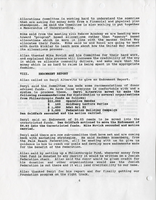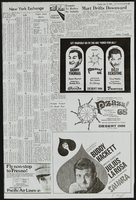Search the Special Collections and Archives Portal
Search Results

Transcript of interview with Fluff LeCoque by Joyce Marshall, May 5, 1997
Date
Archival Collection
Description
This interview is compiled in the bound book version for OH-02270. Born Ffolliott Chorlton in Butte, Montana in 1923, Fluff Le Coque embarked on a career during World War II that would span fifty-five years. Le Coque’s experience as an entertainer started at the age of seven when she began dance lessons during the Great Depression. She expanded her interest in show business at the University of Washington. Attending on a drama scholarship, she performed in theatrical productions and supplemented the scholarship by teaching coordination to university athletes through dance. Le Coque toured as a dancer in a road company during World War II. After the war she came to Las Vegas for the first time. Although she did not consider herself a singer, she performed as a vocalist with the Chuck Gould Orchestra at the Last Frontier. After a brief excursion to Hollywood, she returned to Las Vegas to work at the Thunderbird Hotel as a dancer. It was at the Thunderbird that she became part of the glamour publicity that would help shape the image of Las Vegas. Crowned “Miss Thunderbird,” Le Coque took part in publicity photo shoots designed to attract vacationing customers to the Las Vegas resort casino. While performing at the Thunderbird, Le Coque learned of an opportunity to showcase her talents in a wider arena. She joined a touring company that was preparing to take the production of Hollywood Extravangza to Europe. In Paris, Le Coque took on additional responsibilities in the production end of the business. She served the Hollywood Extravaganza as principal dancer, choreographer, and ballet mistress. On her return to New York, she firmed up her career-long relationship with producers Donn Arden and Ron Fletcher. Le Coque’s association with Arden-Fletcher Productions proved beneficial for an already successful career. She performed as principal dancer for Arden and Fletcher beginning with a six-month engagement at the Lookout House in Cincinnati, Ohio, in the late 1950s Arden wanted her to return to Las Vegas and she accepted immediately. The Las Vegas Desert Inn opened a newly remodeled showroom with Fluff Le Coque as a featured principal dancer. Arden-Fletcher Productions kept a number of performers busy throughout the United States from California to New York. Le Coque, now a valued talent, appeared in the Arden-Fletcher production at the Moulin Rouge in Hollywood. She worked there as company captain and principal dancer for ten years. Following her extended engagement at the Moulin Rouge, she toured the United States and Europe before returning to Las Vegas for good in the late 1960s. Arden again asked her to open a renovated showroom at the Desert Inn and again she agreed. This time Le Coque made Las Vegas her permanent home. She danced until she was forty-five years old and during the later years worked both sides of the stage, as company manager and dancer. Fluff Le Coque retired from dancing in 1970 to enjoy leisure activities and volunteer work. She learned to paint and served as publicity director of the Las Vegas Art Museum. She was wooed out of retirement by Donn Arden, to become company manager of the production show at the new MGM Grand Hotel [later reopened as Bally’s]. At the time of the interview, Le Coque continued to serve as company manager for Jubilee at Bally’s Hotel & Casino. Le Coque’s narrative provides a vivid account of the history of the Las Vegas entertainment industry. In addition to the organization of club circuits during the post-war years, the narrative provides clues about white-black relations during the era. It also informs a wider historical context. Post-war American society underwent significant changes economically, politically, and socially. Expanded work opportunities for women were among those changes. Le Coque’s choice to complete a college education during the 1940s was atypical. Her successful dancing career and later move into production management provides an example of career achievement decades ealier than the majority of American women. By extending her career as a dancer into her forty-fifth year, she resisted the evolving publicity hype that only an ingenue could be a dancer. Her narrative provides a compelling description of both the glamour and physical demands associated with the Las Vegas entertainment industry.
Text
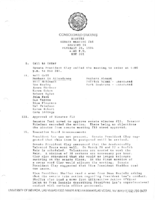
Meeting minutes for Consolidated Student Senate, University of Nevada, Las Vegas, February 28, 1984
Date
Archival Collection
Description
Text

Alan Stock oral history interview: transcript
Date
Archival Collection
Description
Oral history interview with Alan Stock conducted by Barbara Tabach on December 27, 2017 for the Remembering 1 October Oral History Project. In this interview, Alan Stock discusses moving to Las Vegas, Nevada in 1999 for his job as a radio talk show host for KXNT. Stock describes the broadcast that covered the October 1, 2017 Las Vegas mass shooting from 11 PM on that night until 9 AM the next morning. He talks about some of the calls the station received from various members of the community, including survivors of the shooting, families of those at the event, people on lockdown in the nearby hotels, doctors, and general listeners. Stock describes some of the topics discussed on the broadcast, such as what was currently happening on the Las Vegas Strip, stories of the aftermath, and the support needed from the general public. Other topics include gun control and conspiracy theories. He discusses the impact this and other shootings would have on public affairs, including tighter security in daily living and public gatherings. He compares security in the United States to security in Israel and other countries, focusing on the idea of unconcealed guns worn in public. Throughout this interview, Alan Stock explains that the radio station's goal was to provide accurate information to the public during the aftermath of the October 1, 2017 mass shooting.
Text

Meeting minutes for Consolidated Student Senate University of Nevada, Las Vegas, November 5, 1987
Date
Archival Collection
Description
Text
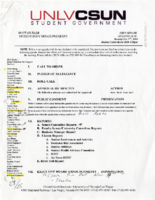
Meeting minutes for Consolidated Student Senate, University of Nevada, Las Vegas, October 27, 2008
Date
Archival Collection
Description
Text

Alpha Kappa Alpha Sorority, Theta Theta Omega Chapter 71st Far West Regional conference reports
Date
Archival Collection
Description
From the Alpha Kappa Alpha Sorority, Incorporated, Theta Theta Omega Chapter Records (MS-01014) -- Chapter records file.
Text
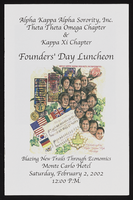
Alpha Kappa Alpha Sorority, Theta Theta Omega Chapter Founders' Day committee reports
Date
Archival Collection
Description
From the Alpha Kappa Alpha Sorority, Incorporated, Theta Theta Omega Chapter Records (MS-01014) -- Chapter records file.
Text

